

Noam-chomsky-on-the-american-university-and-education-system-65547. Chomsky. Education For Whom and For What? Manufacturing Consent. Hume: Many Goverend by the few. David Hume, wikiquote. Where men are the most sure and arrogant, they are commonly the most mistaken, and have there given reins to passion, without that proper deliberation and suspense, which can alone secure them from the grossest absurdities.
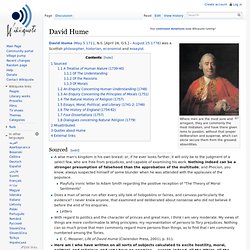
David Hume (May 5 1711, N.S. [April 26, O.S.] – August 25 1776) was a Scottish philosopher, historian, economist and essayist. Sourced[edit] Hume: Of the First Principles of Government. David Hume Rendered into HTML and text by Jon Roland Editing and additional notes based on that of Eugene F.
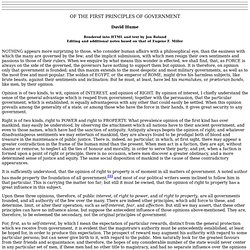
Miller. That Dangerous Radical Aristotle, by Noam Chomsky (Excerpted from The Common Good) Early in January 1997, you gave a talk at a conference in Washington DC.
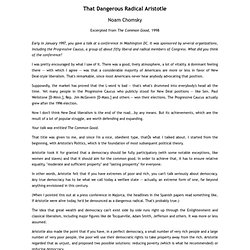
It was sponsored by several organizations, including the Progressive Caucus, a group of about fifty liberal and radical members of Congress. What did you think of the conference? I was pretty encouraged by what I saw of it. There was a good, lively atmosphere, a lot of vitality. A dominant feeling there -- with which I agree -- was that a considerable majority of Americans are more or less in favor of New Deal-style liberalism.
Supposedly, the market has proved that the L-word is bad -- that's what's drummed into everybody's head all the time. Now I don't think New Deal liberalism is the end of the road...by any means. Your talk was entitled The Common Good. That title was given to me, and since I'm a nice, obedient type, thatÕs what I talked about. In other words, Aristotle felt that if you have extremes of poor and rich, you can't talk seriously about democracy. Madison: Opulent vs Majority. James Madison, wikiquotes. Of all the enemies to public liberty war, is, perhaps, the most to be dreaded because it comprises and develops the germ of every other.
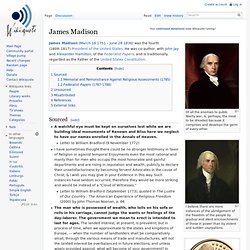
James Madison (March 16 1751 – June 28 1836) was the fourth (1809–1817) President of the United States. He was co-author, with John Jay and Alexander Hamilton, of the Federalist Papers, and is traditionally regarded as the Father of the United States Constitution. Sourced[edit] I believe there are more instances of the abridgement of the freedom of the people by gradual and silent encroachments of those in power than by violent and sudden usurpations. Religion & Govt. will both exist in greater purity, the less they are mixed together. A watchful eye must be kept on ourselves lest while we are building ideal monuments of Renown and Bliss here we neglect to have our names enrolled in the Annals of Heaven.
A popular Government without popular information, or the means of acquiring it, is but a Prologue to a Farce or a Tragedy, or perhaps both. Chomsky james madison the major framer his view was pretty much the same we have to make sure the public is marginalized. Woodrow Wilson. In his first term as President, Wilson persuaded a Democratic Congress to pass a legislative agenda that few presidents have equaled, remaining unmatched up until the New Deal in 1933.[2] This agenda included the Federal Reserve Act, Federal Trade Commission Act, the Clayton Antitrust Act, the Federal Farm Loan Act and an income tax.
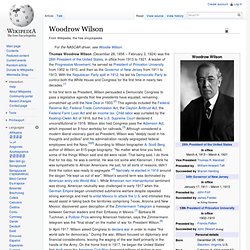
Child labor was curtailed by the Keating–Owen Act of 1916, but the U.S. Supreme Court declared it unconstitutional in 1918. Wilson also had Congress pass the Adamson Act, which imposed an 8-hour workday for railroads.[3] Although considered a modern liberal visionary giant as President, Wilson was "deeply racist in his thoughts and politics" and his administration racially segregated federal employees and the Navy.[4][5] According to Wilson biographer A.
Scott Berg, author of Wilson, an 815-page biography; "No matter what time you lived, some of the things Wilson said and did were racist. Committee on Public Information. The Committee on Public Information, also known as the CPI or the Creel Committee, was an independent agency of the government of the United States created to influence U.S. public opinion regarding American participation in World War I.
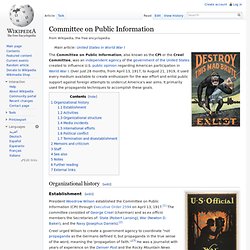
Over just 28 months, from April 13, 1917, to August 21, 1919, it used every medium available to create enthusiasm for the war effort and enlist public support against foreign attempts to undercut America's war aims. It primarily used the propaganda techniques to accomplish these goals. Ralph Waldo Emerson. Ralph Waldo Emerson (May 25, 1803 – April 27, 1882) was an American essayist, lecturer, and poet, who led the Transcendentalist movement of the mid-19th century.
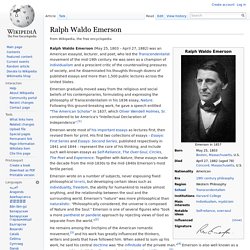
He was seen as a champion of individualism and a prescient critic of the countervailing pressures of society, and he disseminated his thoughts through dozens of published essays and more than 1,500 public lectures across the United States. He remains among the linchpins of the American romantic movement,[3] and his work has greatly influenced the thinkers, writers and poets that have followed him.
When asked to sum up his work, he said his central doctrine was "the infinitude of the private man. "[4] Emerson is also well known as a mentor and friend of fellow Transcendentalist Henry David Thoreau.[5] 21 - Essays - Ralph Waldo Emerson (1803-1882) More E-texts Essays by Ralph Waldo Emerson (1803-1882) Essays: 1 | 2 | 3 | 4 | 5 | 6 | 7 | 8 | 9 | 10 | 11 | 12 | 13 | 14 | 15 | 16 | 17 | 18 | 19 | 20 | 21 |
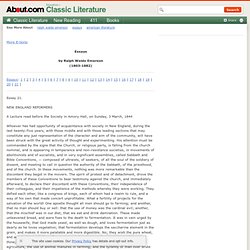
Educate them to keep them from our throuts. Edward Bernays. Ministry of Information (United Kingdom) Lord Beaverbrook (10 February 1918 – 4 November 1918)Lord Downham (4 November 1918 – 10 January 1919)
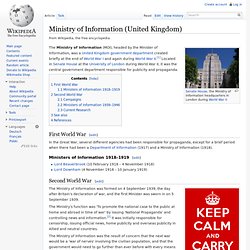
Walter Lippmann, wikipedia. Early life[edit] Career[edit] Lippmann was a journalist, a media critic and an amateur philosopher who tried to reconcile the tensions between liberty and democracy in a complex and modern world, as in his 1920 book Liberty and the News.
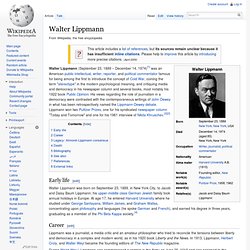
Educational Funding. Education & The class war.